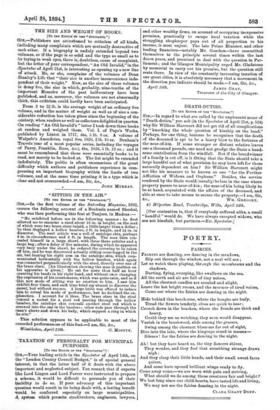DEATH-DUTIES.
[TO THE EDITOR Or TEE " SPECTATOR."]
Sin,—In regard to what are called by the unpleasant name of "Death-duties," you ask (in the Spectator of April 21st, p. 524) why Sir William Harcourt did not get rid of all complications by " knocking the whole question of kinship on the head." Perhaps, for one thing, because he recognises that the death of the deceased is apt to be a heavy blow to the fortunes of the near-of-kin. If some stranger or distant relative leaves one a thousand pounds, one need not grudge the State a hand- some contribution from the windfall. But if the breDdwinner of a family is cut off, is it fitting that the State should take a large handful out of what provision he may have left for those naturally dependent on him P Sir William Harcourt might not like his measure to be known as one "for the Further Affliction of Widows and Orphans." Besides, the service rendered by the State would (usually) be less in the case where property passes to near-of-kin ; the near-of-kin being likely to be at hand, acquainted with the affairs of the deceased, and able at once to take means to secure the property.—I am, Sir, WM. GREGORY.
43 Ifilpertcra Road, Trowbridge, Wilts, April 24th.
[Our contention is, that if everybody suffered alike, a small "handful" would do. We have always excepted widows, who are not kinsfolk, but partners.—ED. Spectator.]


















































 Previous page
Previous page